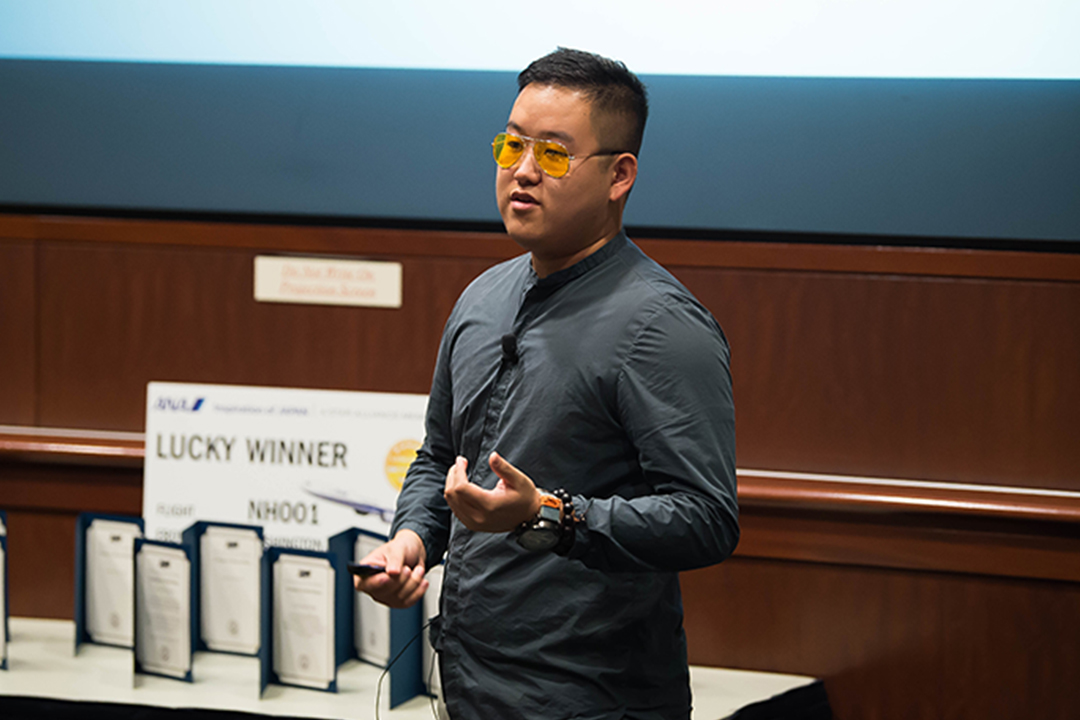Born in China, Yi Zhao considers himself just a mediocre Japanese speaker. His pronunciation isn’t perfect and he reads the language—among the five he’s studied—more fluidly than he speaks it. But when he decided to enter GW’s third annual J.LIVE Talk Japanese speech contest, he was determined that what he lacked in syntax he would make up for with passion.
“There are a lot of people who speak Japanese better than I do,” said Zhao, a junior majoring in Japanese literature with a modern music minor. “If I was going to win, it was going to have to be by showing real emotion and a truthful heart to the judges.”
Zhao competed against more than 30 students from 13 universities across the country, all vying for scholarships, cash prizes and trips to Japan. In his presentation titled "Music," Zhao talked about how Japanese music helped him navigate his journey from China to America as an international student, and how he began studying the language as a middle schooler to understand the lyrics of his favorite Japanese pop songs. The panel of judges—including a representative from the Japanese Embassy, an executive from the Mitsui & Co. international trading firm and a scholar from Nanzan University in Central Japan—awarded Zhao first place Gold Medal honors, including $300 and a round-trip ticket to Japan.
For students like Zhao, the 2017 J.LIVE (Japanese Learning Inspired Vision and Engagement) Talk competition offered a dynamic opportunity to sharpen their communication skills while sharing cultural experiences. “As an institution that fosters leadership and innovative ideas, as well as being situated in the heart of the nation’s capital, GW is a perfect ground for J.LIVE Talk to grow,” said Shoko Hamano, professor of Japanese and international affairs and chair of Columbian College’s Department of East Asian Languages and Literatures (EALL). “Through the competition, EALL faculty and students have come to know the local Japanese community better. This has resulted in more access to their support for cultural activities such as guest speakers, student visitors from Japan, internship opportunities for our students and various other resources.”
With Japanese ranking among the top five foreign languages studied in the United States, the J.LIVE Talk competition encourages students to expand their linguistic skills while exploring Japan’s global industrial and cultural influences, says Takae Tsujioka, J.LIVE Talk executive director and a teaching assistant professor in Japanese language. “Learning a language like Japanese not only equips students with linguistic skills but changes them from within,” she said. “You gain new perspectives, understandings and appreciation of who you are and how you engage with the world.”
From a field of 18 semi-finalists, nine students advanced to the final round of the contest, submitting PowerPoint presentations and a short abstract to accompany their demonstrations. Their four-to-six-minute speeches were graded on vision, engagement, language and communication, and were followed by a rigorous question-and-answer period from the judges and audience. Zhao was even asked to sing in Japanese.
Zhao, who visited Japan as a child, plans to take advantage of the funding and plane ticket he received to spend the summer in Tokyo. While there, he hopes to further develop his language skills and perhaps apprentice with a sushi chef. Zhao rates himself just “a passable cook,” but, as with languages, he said “I’m a fast learner.”
0d5">


